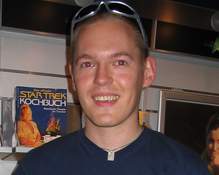Person
Description
Klaus Meffert

Besides his regular job, Klaus is working on his doctorate subjected to Design Patterns at the Technical University of Ilmenau, Germany. Additionally, he writes technical articles about Genetic Algorithms, Genetic Programming, Object-Orientation and other aspects of software development for various German magazines and the SAP Developer Network. In June, 2006, his book about JUnit, the testing framework, was published.
JGAP is his main activity besides dissertation and regular job, on which he spends much time to make JGAP a unique experience when it comes to Genetic Algorithms, Genetic Programming and Grid Computing.
Javier Meseguer
&
Enrique D. Martí
&
Enrique D. Martí
Inspiration-Giver
Not enough with that, Javier helped a lot improving JGAP by bringing in new ideas and inspirations to the project.
Audrius
Meskauskas

He sees JGAP as a highly interesting application of biological conceptions in informatics. Audrius implements modules, based mainly on the current knowledge of molecular genetics (supergenes, etc).
Jerry
Vos
Neil
Rotstan
From Livejournal: Neil is a software engineer who spends his days staring at a dim computer screen and banging his head against his desk. When not at work, he can usually be found at a martial-arts studio where he studies kempo-karate and is learning to become an assistant instructor.